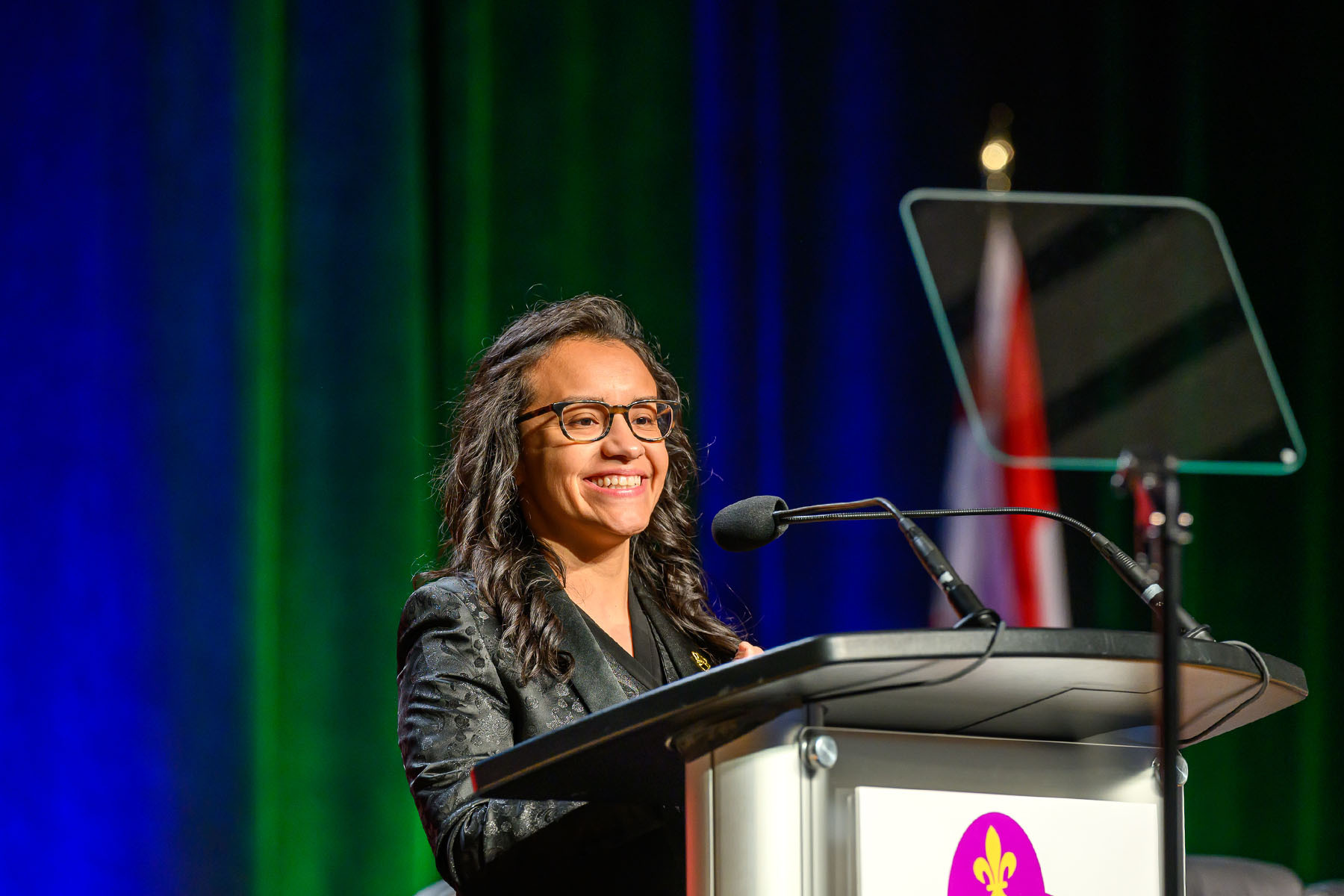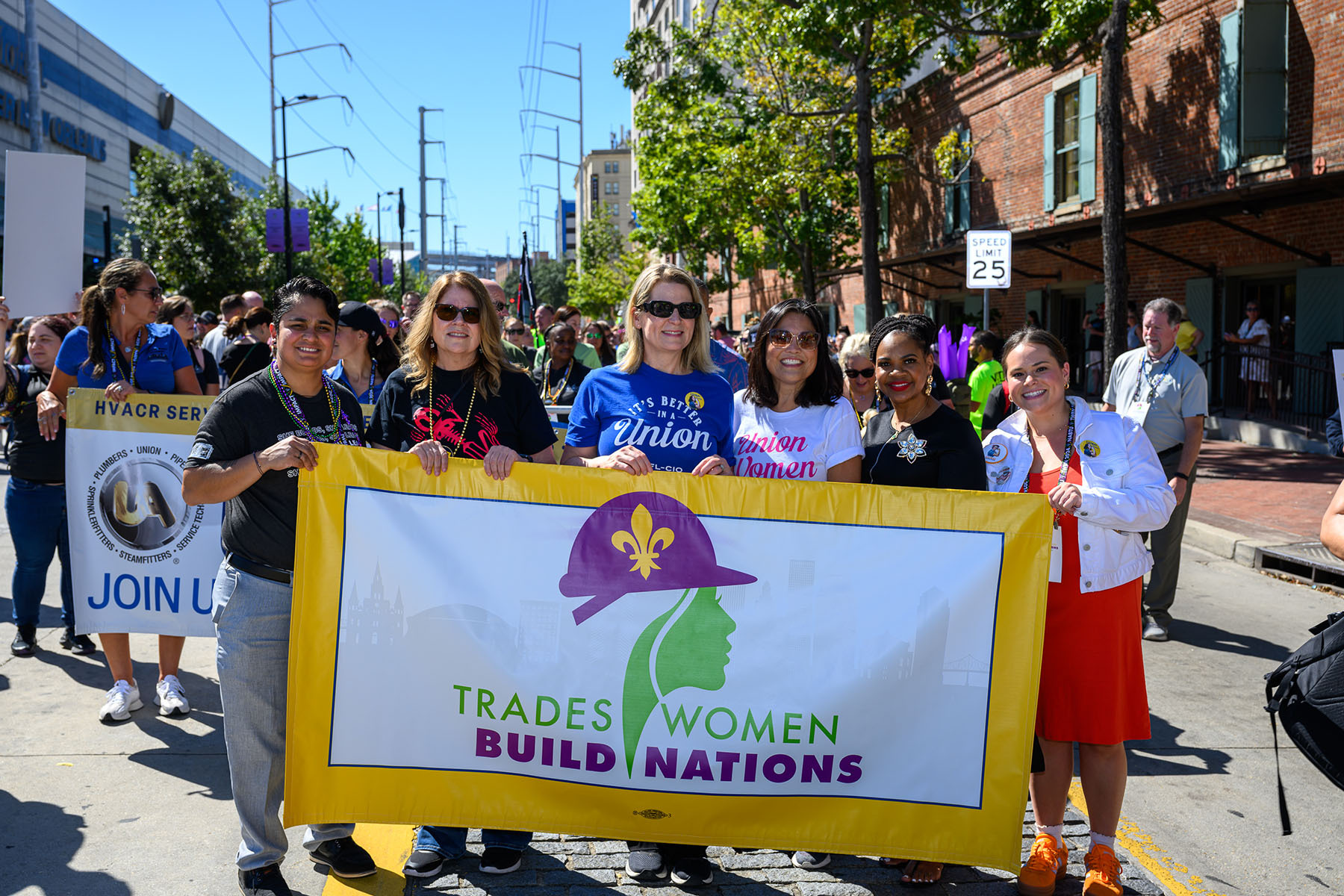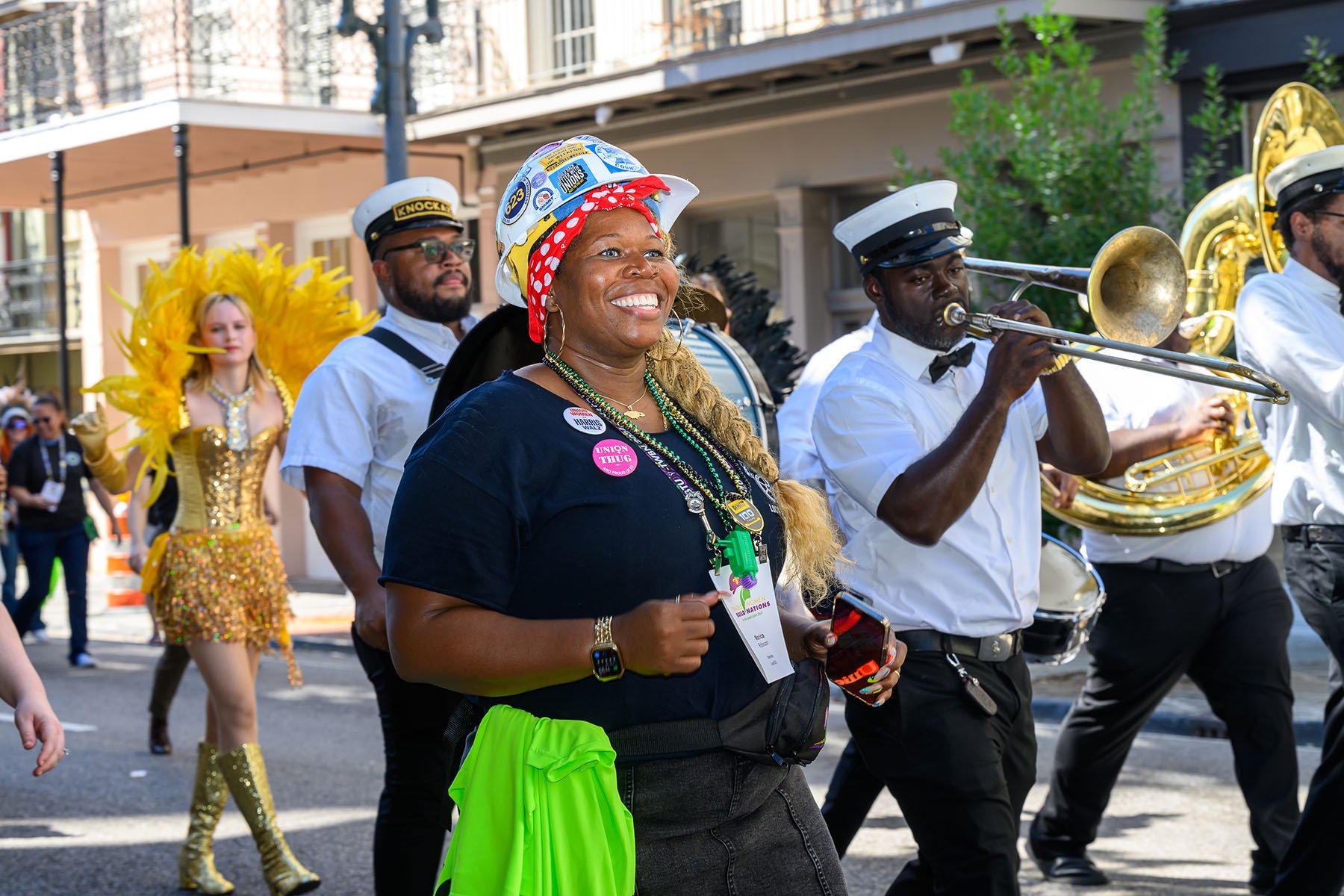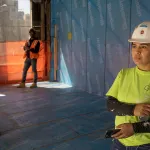Your trusted source for contextualizing business & economy and Election 2024 news. Sign up for our daily newsletter.
NEW ORLEANS — In late September, thousands of tradeswomen marched through the streets of the city for their annual parade. Draped in Mardi Gras beads and wearing hardhats plastered in stickers, they clacked noisemakers and rang cowbells as they snaked their way along the route under the heat of the midday sun. Rosie the Riveter is their unofficial mascot, and the iconic World War II poster — which came to symbolize the women who worked in factories and shipyards during the war — was emblazoned on nearly every union banner that passed by.
Some women wore Rosie’s trademark red bandana with its bow cocked to the side in her honor. Many others dressed in union T-shirts depicting various interpretations of her iconic pose, with her arm flexed to show off her strong biceps. One poster even depicted a Rosie-fied picture of Kamala Harris, with the words, “A Woman’s Place is in the White House.”
It was a reminder that this year, the parade wasn’t just about a show of sisterhood, it was also unabashedly about politics. For women in the trades, the stakes couldn’t be higher this election.
The parade is a beloved tradition of the Tradeswomen Build Nations Conference, which has served as an important hub for the electricians, insulators, painters, carpenters, elevator constructors, boilermakers, brick layers, welders and ironworkers that make up a small but growing contingent of unionized women in the construction business.
At the morning plenary of the conference, which boasted over 5,000 attendees from across the country, neon yellow Vote Union T-shirts were draped across seats, each accompanied by blue campaign posters with things like, “Building Trades for Harris Walz,” and “Thank You Joe!” printed in big white letters.
The opening speeches by industry leaders celebrated the strides women have made in a workplace that is still overwhelmingly male and recognized the barriers that prevent many from finding their place in the trades. But they warned that union jobs were at risk this election, and that any gains women have made in the industry could be erased by a Donald Trump presidency.
As North America’s Building Trades Unions (NABTU) President Sean McGarvey told the attendees that morning: “Joe Biden and Kamala Harris have been the game changers for us in the unionized building trades … Creating pathways for women in construction like never before.” He added, “We must ensure that the progress we made isn’t rolled back by a tyrant dictator who doesn’t value the constitution or respect women’s rights.”
One bilingual speaker at the plenary, Adriana Lopez, an ironworker, talked about her journey into the workforce after being raised by a single mom, and how joining a trade union provided her with a sense of stability and upward economic mobility. “I love my union, I love our democracy, I love the progress our unions have made,” she said. And in a nod to one of Harris’ campaign slogans, she told the crowd, “As one of the great ones has recently said, ‘We are not going back.’”

Her speech tied directly to the theme of this year’s conference, Let the Good Jobs Roll, a nod to the hundreds of thousands of jobs created through the Bipartisan Infrastructure Law, Inflation Reduction Act, and CHIPS and Science Act, three pieces of legislation totalling over $2 trillion that passed under the Biden administration and have bolstered demand for skilled trades workers amid a massive building boom.
Many of the tradeswomen The 19th interviewed at the conference said a career in the trades had offered a pathway into the middle class. Women who previously had been stuck in minimum-wage jobs in retail and child care — industries that are historically low-paying and disproportionately employ women — had tripled and quadrupled their wages and now had union-protected pensions and benefits.
Unlike other higher paying jobs, these careers do not require a college degree, and the apprenticeship programs are paid — meaning women can make a liveable wage while earning the required certifications to enter the workforce. In the trades, they have a greater chance at wage parity. According to the Bureau of Labor Statistics, women in construction earn about 95 percent of what men earn, while the average gender pay gap across other industries is 81 percent.
Treasure Saunders, a technical engineer at the United Association, which represents plumbers and pipefitters, said before she found her apprenticeship program she was living below the poverty line in Chicago and didn’t have health insurance.
“As soon as I got in [to the apprentice program], I got with an amazing company that was giving me all the overtime I wanted. My life just completely got easier,” she said. Saunders, who is a single mom of three, said her kids were happier and she was able to move them into better schools. With health insurance, she could finally take care of her and her family’s needs. “I was able to go to the dentist. I put braces on both of my children. I put braces on myself,” she said. “We were going to the doctor, like, every week for a while, just trying to catch up.”
She put away enough savings to buy a quadplex that she rents out for extra income. “It was completely life-changing,” she said. “I didn’t have a college degree, and there was no way I was going to be able to go back to school.”
She, like other women The 19th spoke to, said she’s voting for Harris because she feels like her job security depends on it. She’s currently working on a project to expand the Chicago Transit Authority’s light rail that was funded by the Bipartisan Infrastructure Law. “We are supposed to directly go from that job to another,” she said. But some companies, she said, have put projects on pause until after the election. If Trump wins, there are fears that funding might not materialize for some of these slated plans.
Even if projects move forward, if Trump wins, project labor agreements (PLAs), or bargaining agreements negotiated between union construction and contractors ahead of a project, could evaporate. Under Biden, they were mandated for large-scale federal infrastructure projects. But Project 2025, the conservative blueprint for a Trump administration, seeks to terminate them. Trump has tried to distance his campaign from the playbook, but he has deep ties with many of its creators and with the Heritage Foundation, which drafted the document.
PLAs are important because they all but guarantee union labor will be used, and they also dictate certain conditions like the funding of union apprenticeship programs. Some PLAs have required access to affordable child care for workers.
Harris has pledged her own commitments to expand on investments in registered union apprenticeship programs, which historically have a higher success rate at recruiting women and people of color than non-union programs. The Trump administration, on the other hand, tried to weaken these programs through creating industry-recognized apprenticeships, which had fewer regulations attached and undercut union-led ones, something Project 2025 wants to bring back.
As Liz Shuler, the first woman president of the AFL-CIO, told The 19th, the strides women and people of color are making in the trades are at risk.
“We’ve seen the patterns of the Trump administration,” she said. “Even just the rhetoric of DEI hires being negative, when in fact, we’re making progress, and we’re starting to elevate the awareness and the commitment of these companies to hire more women.” A lot of initiatives aimed at making the workplace more inclusive and welcoming to women are voluntary, and not mandated. “We don’t want to actually give [these companies] ammunition to start getting rid of these programs,” she said.

While women only make up about 4 percent of the construction trades workforce as of 2023, their ranks are increasing. Since 2018, 80,000 women have joined the construction workforce — a growth of 28 percent — and the number of women in training as apprentices has increased by 55 percent. When accounting for women in construction overall, including more admin and office-type roles, they make up about 10 percent of the industry, or 1.28 million workers.
But while tradeswomen have made gains, there are still many uphill battles to be won to improve their retention in the industry. Many of the conference’s breakout sessions were focused on those pain points, including a session on addressing workplace harassment and bullying, child care, and supporting the fertility lifecycle through gender-specific health care and parental leave, benefits that haven’t been a part of packages in the past.
Union organizers feel that Harris would champion the work of the Biden administration to tackle some of these issues. Liz McElroy, vice president of government Affairs for the International Union of Painters and Allied Trades, put it this way in a discussion on policy: “[The Biden administration] came to unions, and said, ‘What do you need right in order to organize more people?’ And so I think we could have one of those for gender equity,” she said. “We could talk about what the working women need on the job, and really do a whole government approach to that.”
Child care is one of the main policy issues that the federal government could address that would help women in the trades keep their jobs. Unlike the WWII-era Riveters, who benefited from the country’s first and only federally funded universal child care program — which supported hundreds of war nurseries so that women working in ammunition plants wouldn’t have to miss work — no such program exists for modern-day tradeswomen.
To fill that gap, organizations like NABTU are piloting child care programs that offer non-traditional hours and child care stipends. Tradeswomen themselves are finding stopgap solutions like providing child care at union meetings. The Biden administration has taken some action to help, too, through laws like the Chips and Science Act, which included a child care requirement for microchip companies that receive large federal grants to build out their manufacturing facilities in the United States.
Affordable child care has been one of Harris’ campaign priorities — she called it an important pillar to the “opportunity economy” she wants to create as president. In her campaign, she’s committed to lower the cost of child care and expand the child tax credit. Trump’s stance has been less clear on the issue, though in recent months he’s begun to talk about child care more and has said he supports a child tax credit. Republicans historically have pushed back against efforts to expand child care access.
While one of the biggest campaign issues, abortion access, never explicitly came up in the policy discussion, one attendee, Alexa Holmes, said it’s another aspect of this conversation on child care. “If you can’t choose when or whether you are going to have kids, you can’t be an active part of the workforce, or it’s much harder,” Holmes, a carpenter from Boston, said. “It limits our capability.”
Persistent sexual harassment and discrimination continues to be another barrier for women in the building trades. Last year, the U.S. Equal Employment Opportunity Commission released a report detailing several incidents of sexual harassment, including women being groped or subject to sexual jokes or lewd workplace graffiti on construction sites. In 2021, the Institute for Women’s Policy Research, an advocacy organization, found that 26.5 percent of the workers it surveyed said they were ”always or frequently” harassed for being a woman.
It was an aspect of the workplace that union leaders at the conference acknowledged was far from being solved and was yet another reason they were urging tradeswomen to vote for Harris at the polls.
“This November we need to vote for our jobs, our infrastructure, for our health care and our retirement and pensions, but we also have to vote for what’s right,” Brent Booker, president of the Laborers’ International Union of North America, said at the podium that morning. “I don’t want to have to beg for scraps from a convicted rapist.”
In a room full of women, some of whom have faced their own run-ins with sexual harassment, the crowd erupted in cheers.
To check your voter registration status or to get more information about registering to vote, text 19thnews to 26797.





